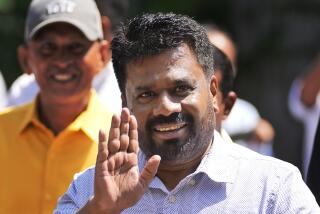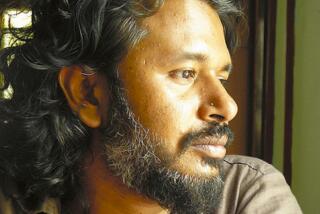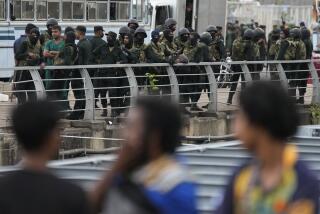Sri Lanka’s Bizarre Leader Confounds His Foes : South Asia: With ‘hocus-pocus’ and ruthlessness, Premadasa has managed to make enemies at home and abroad.
- Share via
COLOMBO, Sri Lanka — When a handful of dissidents in the Cabinet of Sri Lankan President Ranasinghe Premadasa filed unprecedented impeachment proceedings against him late last year, they accused him of 15 specific violations of the nation’s constitution.
The impeachment charges were part of a generally unremarkable legal document. But then there was a final section that began, “We also allege that the president is permanently incapable of discharging the functions of his office by reason of mental and physical infirmity.”
To illustrate, Premadasa’s accusers listed 24 separate charges that read more like grounds for commitment to a mental hospital. To wit:
* Ordering the construction of a gold-painted replica of the throne used by ancient Sri Lankan kings for official functions at his home.
* Ordering newspapers to publish false stories “to mislead the public to believe them as miracles,” among them a speech Premadasa delivered pronouncing the shape of the previous night’s moon an omen for peace in his war-torn nation.
* “Transporting a specially blessed chair for his use to all functions he attends and using official security officers to protect the chair.”
* Falsifying his own personal history by establishing a museum with fake personal effects and ordering ghost-written books “for the purpose of portraying himself to be an author, poet and an intellectual.”
And finally, there was the allegation in Subparagraph X: “Living in suspicion and hatred of all others, particularly his ministers and party men . . . and making use of a hired squad to intimidate and harass them.”
Not included in the allegations is what some say happened later in the fall, on the morning of the parliamentary vote on impeachment.
“He had come with some oddballs--magicians from (the South Indian state of) Kerala--people who cast spells,” recalled former Cabinet minister Lalith Athulathmudali, a onetime political ally of Premadasa who is now his principal foe. Early in the morning, before the members of Parliament filed into the assembly building, the magicians reportedly coated each opposition chair with holy oil and cast spells that would ensure Premadasa’s victory.
It’s not clear whether sorcery actually helped Sri Lanka’s mercurial president successfully beat back the strongest challenge yet to his strange, authoritarian rule that day. But the story, whether true or not, underscores Premadasa’s image as one of the Third World’s most bizarre and individualistic national leaders.
The story of Premadasa and his odd style of rule over this tiny Indian Ocean island nation is a compelling one in its own right. But in a post-Cold War world of rapidly changing alliances and ambiguous political imperatives, the diminutive, 67-year-old Sri Lankan symbolizes a broader phenomenon, one in which less-developed nations are increasingly using democracy to elect authoritarian regimes.
When Premadasa was elected three years ago, his nationalist and populist credentials were unquestioned. His campaign speeches were awash in anti-Western and anti-Establishment rhetoric advocating that his 18 million countrymen throw off the yoke of more than a century of British colonial rule and four decades of neo-colonialism by Sri Lanka’s educated, Westernized elite.
Most analysts concluded at the time that Premadasa’s 50.43% vote total represented a landmark shift in the country’s sociopolitical character. He was, after all, a member of one of the lowest Buddhist castes on the deeply religious and superstitious island. As such, his was a classic rags-to-riches story, one that foreshadowed a shift away from Western thinking and back to the roots of Sri Lanka’s rich nationalist, religious traditions.
During his three years of often-idiosyncratic, iron-fisted rule, however, Premadasa has won at least as many enemies as friends--both at home and as far away as the Western capitals that provide the international aid that keeps his impoverished country functioning.
“I don’t think he’s mad. I think he’s ruthless,” said one Western diplomat who has closely followed Premadasa’s reign. “He’s stubborn. He’s contrary. He’s not an intellectual in any sense of the word. He’s a populist who has made his career on taking care of the little man.”
The most brutal illustration of Premadasa’s ruthlessness was his counterinsurgency campaign against a militant, leftist rebellion that swept through the south and central regions of the island. With the aid of a network of death squads, the president succeeded in wiping out the People’s Liberation Front, largely by slaughtering at least 20,000 of his countrymen, including the leadership of the movement.
On the political front, Premadasa has maintained his singular hold on power by using the threat of expulsion to discourage any dissent within either his Cabinet or his ruling United Nationalist Party, which recently split into two factions after the dissidents’ failed impeachment move.
“There is no democracy within the party. If you protested, you were in trouble,” said Athulathmudali, who recently formed the opposition Democratic United National Front after Premadasa expelled him for leading the impeachment effort.
“He himself said, rightly, that he’s a one-man show. His authoritarian tendencies completely alienated the rank and file of the party.”
Asked whether any democratic checks and balances remain in the nation after the Supreme Court rejected the impeachment on technical grounds last month, Athulathmudali said, “Absolutely none--nothing.”
Clearly, such a style of governance, even in a place as remote as Sri Lanka, has an international dimension. Most recently, Premadasa infuriated Washington by ordering his ambassador to oppose the U.S. campaign to repeal the United Nations resolution equating Zionism with racism--a campaign in which even India, a traditional foe of Israel, sided with the United States in the General Assembly vote that overturned the resolution.
“All Premadasa had to do was abstain on the issue, and that’s what all his advisers were telling him to do,” one Western diplomat said. “But he insisted on voting against the West, a personal obsession that ultimately is going to hurt his country at the international donors’ meeting next month, when they decide how much aid Sri Lanka will get this year.”
For former political allies such as Athulathmudali, there are even more glaring examples of how Premadasa’s obsession with nationalism can threaten Sri Lanka’s reputation. Athulathmudali sharply criticized the president’s decision last year to expel Britain’s ambassador to Sri Lanka, saying that the action was taken on “insufficient grounds.”
But the most blatant example, Athulathmudali recalled, emerged in a series of Cabinet meetings after Iraqi President Saddam Hussein’s invasion of Kuwait on Aug. 2, 1990.
“Premadasa came out hostile to the (U.S.-led) coalition, and he wanted to back Saddam,” said Athulathmudali, who was a member of the Cabinet at the time. “Then, on one of the rare occasions on which I actually spoke out, I said, ‘This is crazy. What’s our interest in this?’ I said, ‘How can we back Saddam when he invaded Kuwait and threw out 70,000 Sri Lankan contract workers?’
“I argued with him for 2 1/2 hours, and the only thing that finally convinced him was I said, ‘Sir, the reason I am supporting Kuwait is that it is a small country. Iraq is a big country that has invaded the little country, so we must support Kuwait, the little country.’
“Suddenly, he stood up. His eyes lit up, and then he said, ‘Right. Let’s support Kuwait, the little country.’
“At first, it was the anti-American thing--these big countries telling us what to do. But, I mean, his thinking is crazy. . . . I’ll put it this way: He just doesn’t think the way you and I do.”
That, precisely, is Premadasa’s point. Although he has never granted an interview to a journalist during his three years in office, the president has made clear in his speeches that his leadership represents a turning point in Sri Lankan society--proof that his people no longer rely entirely on so-called elitist leaders such as Athulathmudali, a veteran politician who was educated at Britain’s Oxford University.
Such arguments, though, are lost on Athulathmudali. He responds that the majority of Sri Lankans, who vote along caste lines, are members of the nation’s higher caste. He adds that they elected Premadasa three years ago not because he was a low-caste populist, but because he was then the sitting prime minister.
“You simply can’t buck the established society,” Athulathmudali said, perhaps betraying a bit of the arrogance that Premadasa abhors. “The masses want people like us because the common man wants to be led by an uncommon man.”
But for such opponents, Premadasa’s reliance on the spiritual-minded and the superstitious bodes the worst for Sri Lanka, a nation known for its traditionally higher-than-average literacy rates and highly marketable skills for contract work abroad.
“He believes in the hocus-pocus,” Athulathmudali said of the president who, it is true, insists that his entrance at every official state event be preceded by traditional Sri Lankan dancers and musicians who bless the floor just before he steps on it.
“He believes in all this. He prays at 4 a.m. every day to all the gods of the world. Christ is there, Buddha, Mohammed and all the Hindu deities. His staff says he shouts out loud in the middle of it all.”
What is more, the president has not left the island once since he took office, an aversion to travel often attributed to the advice of his personal astrologers.
And Athulathmudali, who once served as defense minister, asserted that even the Sri Lankan army, which continues to fight a bloody insurgency of minority Tamil guerrillas on the island’s northern Jaffna peninsula, is tiring of Premadasa’s quirks.
In a new world order dominated by the West, in which only the well-educated will thrive, Athulathmudali concludes that it is not only the “hocus-pocus” that spells trouble for a Premadasa-led Sri Lanka--it is what such thinking symbolizes.
“He is not interested in any kind of intellectual approach to any problem,” he said. “He says, ‘Let’s do it because it looks good.’ That may work in harnessing nationalism in the short run, but I think it’s disastrous in an increasingly competitive world in the long run.”
Profile: Ranasinghe Premadasa, President of Sri Lanka
Background: Born June 23, 1924, in Colombo, into Buddhist family, part of Sinhalese majority, in nation then known as Ceylon. Raised a strict Buddhist, but graduated from respected St. Joseph’s College, run by Catholics.
Career: Joined Ceylon Labor Party as a youth, elected to Colombo City Council in 1949, after island’s independence from Britain. Won seat in national Parliament in 1965, named prime minister in 1977. Elected president by narrow majority in December, 1988.
Attributes: Writes Sinhalese poetry, prays daily, does not smoke or drink. An anti-Western nationalist and populist, he crushed a leftist rebellion in south and central Sri Lanka; runs ruling party with an iron fist. Enemies accuse him of violating constitution and using sorcery to stay in office.
Challenge: Secessionist war by Liberation Tigers of Tamil Eelam in northern and eastern regions of Sri Lanka, where tens of thousands have been killed in nine years.
Quote: “We must create our own resources. We must build with our own resources. Depending needlessly on foreign assistance is to mortgage both our independence and our future.”
More to Read
Sign up for Essential California
The most important California stories and recommendations in your inbox every morning.
You may occasionally receive promotional content from the Los Angeles Times.













